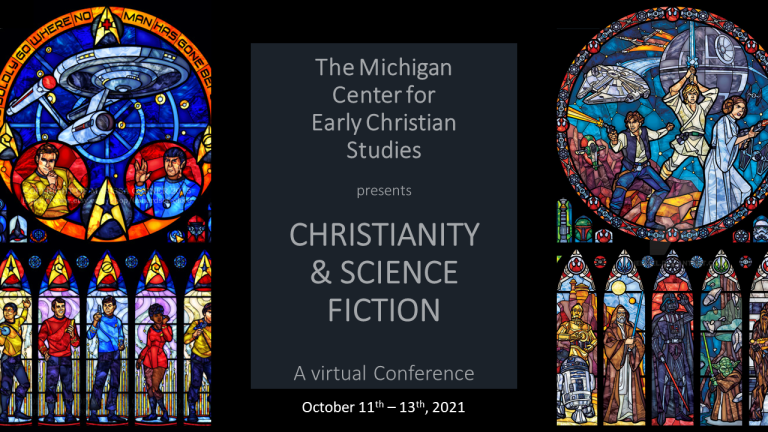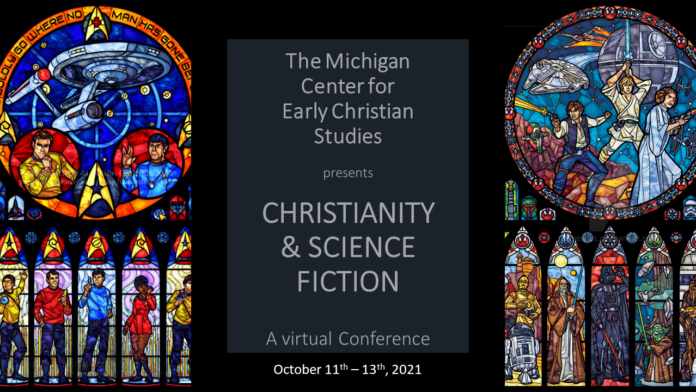The website for the conference on Christianity and Science Fiction is back up and running, thankfully! Here are the details for blog readers, for your convenience:
Christianity & Science Fiction: A Virtual Event (11-12 October, 2021)
The Michigan Center for Early Christian Studies, in partnership with the Department of Middle East Studies (University of Michigan), is pleased to announce a four-day virtual conference that explores the symbiotic relationship between Christianity and science fiction. The meeting is chaired by James McGrath, Gabriele Boccaccini, Jason von Ehrenkrook, Deborah Forger, and Joshua Scott.
“Christianity and Science Fiction” is the first conference in a new series sponsored by the Michigan Center for Early Christian Studies. Part of MCECS’s mission is to foster understanding of the legacy of the Christian tradition in its impact on contemporary culture. The keynote speaker and academic presenters at the conference will each offer a glimpse of how the relationship between Christianity and science fiction appears from one particular vantage point, or at one particular example of intersection. Christianity is not a single entity with a unified perspective, and neither is science fiction. Studying the interplay between the two provides insights into both and into the roles they play in contemporary society.
Registration
Registration is free. Please consider supporting the work of the MCECS with a donation.
Sign up for the event here: https://tinyurl.com/cfzkd72c
Schedule
**Schedule is based on EDT/New York Time**
MONDAY, October 11th
12:00-12:30 EST: Conference Welcome
12:30-2:30pm: Themed Session 1: Technology and Nature
20min: “I See a Suite of Armor around the World”: Tony’s Stark’s Techno-Idolatry
Jason Eberl (St. Louis University)
20min: Ritual at the Edge of Reality: Language and World-Creation in Karin Tidbeck’s Amatka
Maria Doerfler (Yale University)
20min: Diving Deeper into DEVS
Juli Gittinger (Georgia College and State University)
20min: Canon and Apocrypha in Neon Genesis Evangelion
Gavin McDowell (KU Leuven)
45 minutes discussion
2:45-3:00pm: BREAK
3:00-4:30pm: Keynote and Q&A
My Spiritual Journey as a SF Writer
Maurice Broaddus
TUESDAY October 12th
12:00-1:00pm EST: Welcome & Recap
1:15-3:00pm: Themed Session 2: Space
20mins: Far Beyond Those Distant Stars: Star Trek: Deep Space Nine and an Afrofuturistic Approach to Religion
Roger Sneed (Furman University)
20mins: Shore Leave: The Theological Significance of Rest in the Star Trek Universe
Amanda MacInnis Hackney (University of Toronto)
20mins: Jesuits in Science Fiction about Space Travel
Paul Levinson (Fordham University)
45 minutes discussion
3:00-3:15pm: BREAK
3:15-4:30pm: Themed Session 3: Apocalypses, Dystopias, and Utopias
20min: Utopia and the Kingdom of Heaven in the Legion of Super-Heroes and Miracleman
Gabriel McKee (New York University)
20min: The Virgin is a Cyborg: Cherrie Moraga’s ‘Heroes and Saints’ as Chicana Mariophany
Rudy Busto (University of California, Santa Barbara)
30 minutes discussion
4:30-4:45pm: Conclusion of Conference
Announcements about next year’s conference on “Christianity and Music”
Keynote Speaker
Keynote: Maurice Broaddus
My Spiritual Journey as a SF Writer
Bio: Maurice Broaddus is an accidental teacher (at the Oaks Academy Middle School), an accidental librarian (the School Library Manager which part of the IndyPL Shared System), and a purposeful community organizer (resident Afrofuturist at the Kheprw Institute). His work has appeared in Magazine of F&SF, Lightspeed Magazine, Beneath Ceaseless Skies, Asimov’s, and Uncanny Magazine, with some of his stories having been collected in The Voices of Martyrs. His novels include the urban fantasy trilogy, The Knights of Breton Court, the steampunk novel, Pimp My Airship, and the middle grade detective novel series, The Usual Suspects. As an editor, he’s worked on Dark Faith, Fireside Magazine, and Apex Magazine. His gaming work includes writing for the Marvel Super-Heroes, Leverage, and Firefly role-playing games as well as working as a consultant on Watch Dogs 2. Learn more about him at MauriceBroaddus.com.
Speakers & Presentation Titles
Rudy Busto (University of California, Santa Barbara), The Virgin is a Cyborg: Cherrie Moraga’s ‘Heroes and Saints’ as Chicana Mariophany
Maria Doerfler (Yale University), Ritual at the Edge of Reality: Language and World-Creation in Karin Tidbeck’s Amatka
Jason Eberl (St. Louis University), “I See a Suite of Armor around the World”: Tony’s Stark’s Techno-Idolatry
Juli Gittinger (Georgia College and State University), Diving Deeper into DEVS
Amanda MacInnis Hackney (University of Toronto), Shore Leave: The Theological Significance of Rest in the Star Trek Universe
Paul Levinson (Fordham University), Jesuits in Science Fiction about Space Travel
Gavin McDowell, Canon and Apocrypha in Neon Genesis Evangelion
Gabriel McKee (New York University), Utopia and the Kingdom of Heaven in the Legion of Super-Heroes and Miracleman
Kelly J. Murphy (Central Michigan University), Nostrum Remedium: Apocalypse and Science Fiction
Roger Sneed (Furman University), Far Beyond Those Distant Stars: Star Trek: Deep Space Nine and an Afrofuturistic Approach to Religion
Presenter Bios
Maria E. Doerfler, PhD, serves as Assistant Professor of Late Antiquity at Yale University’s Department of Religious Studies. She is fascinated with stories, both professionally and personally. Her most recent book, forthcoming with the University of California Press, deals with the intersection of writing law and creating sacred histories. She’s an avid reader of science fiction and speculative fiction more broadly, and is still amazed that people let her teach courses on this.
Jason T. Eberl, PhD, is Professor of Health Care Ethics and Philosophy and Director of the Albert Gnaegi Center for Health Care Ethics at Saint Louis University. His research interests include the philosophy of human nature and its application to issues at the margins of life; ethical issues related to end-of-life care, genetics, and healthcare allocation; and the philosophical thought of Thomas Aquinas. He is the author of Thomistic Principles and Bioethics, The Routledge Guidebook to Aquinas’ Summa Theologiae, and The Nature of Human Persons: Metaphysics and Bioethics, as well as the editor of Contemporary Controversies in Catholic Bioethics. Additionally, he has edited volumes on philosophical themes in Star Wars, Star Trek, Sons of Anarchy, Battlestar Galactica, and the films of Christopher Nolan. He has also written essays for similar volumes on Terminator, Avatar, Harry Potter, The Big Lebowski, The Hunger Games, Stanley Kubrick, J.J. Abrams, Metallica, Hamilton, and Westworld.
Juli Gittinger, PhD, is an Assistant Professor of South Asian religions at Georgia College. She received her PhD from McGill University in Montreal with emphasis on contemporary issues in Hinduism (nationalism, gender, digital media). She has Master’s degrees from University of Colorado in Boulder and from SOAS in London. Her areas of personal research interest are Hindu nationalism and religion in media/popular culture. Recent publications include her second book Personhood in Science Fiction: religious and philosophical considerations (Palgrave 2019) and a co-edited volume on Westworld and Theology (Lexington Press 2020).
Dr. Amanda MacInnis Hackney’s (University of Toronto – Wycliffe College) main area of research focuses on how theologians use and interpret Scripture in their systematic theologies. Besides teaching college and seminary classes in theology, method, and ethics, Dr. Hackney is the co-editor of the forthcoming Theology and Star Trek volume, and the curator of the Women and Theology Research Database (launches Fall 2021). Originally from Canada, Dr. Hackney has recently moved to Upstate South Carolina.
Gavin McDowell, PhD, is currently a postdoctoral researcher participating in the project “TEXTEVOLVE: A New Approach to the Evolution of Texts Based on the Manuscripts of the Targums” hosted at KU Leuven. Prior to this, he was a membre régulier spécial at the Institut d’études anciennes et médiévales of Université Laval (Québec City, Canada), where he studied the use of the “Old Testament Pseudepigrapha” as Christian hagiography. His doctoral thesis, “The Sacred History in Late Antiquity,” examined the relationship between the rabbinic work Pirqe de-Rabbi Eliezer and two similar writings, the Second Temple Book of Jubilees and the Syriac Cave of Treasures. His primary research interest is the reception of biblical, deuterocanonical, and apocryphal literature within Christianity and Judaism.
Paul Levinson, PhD, is Professor of Communication & Media Studies at Fordham University in NYC. His nonfiction books, including The Soft Edge, Digital McLuhan, Realspace, Cellphone, New New Media, McLuhan in an Age of Social Media, and Fake News in Real Context have been translated into 15 languages. His science fiction novels include The Silk Code (winner of the Locus Award for Best First Science Fiction Novel of 1999), Borrowed Tides, The Consciousness Plague, The Pixel Eye, The Plot To Save Socrates, Unburning Alexandria, and Chronica. His award-nominated novelette, “The Chronology Protection Case,” was made into a short film and is on Amazon Prime Video. He appears on CBS News, CNN, MSNBC, Fox News, the Discovery Channel, National Geographic, the History Channel, and NPR. His 1972 album, Twice Upon A Rhyme, was re-issued in 2010, and his new album, Welcome Up: Songs of Space and Time, was released in 2020.
Gabriel Mckee is a librarian at New York University’s Institute for the Study of the Ancient World. His research explores the intersection of religion, science fiction, bibliography, and countercultures. He is co-editor of the forthcoming volume Theology and the DC Universe, and is currently at work on a monograph on Fortean author and publisher Gray Barker and his flying saucer press, Saucerian Books.
Roger Sneed, PhD, is the Dorothy and B.H. Peace, Jr. Profession and Chair of the Religion Department at Furman University, where he has taught since 2007. He teaches African American Religious History and Thought, Christian Ethics, Sexuality and Christian Theologies, Introduction to Religion, and a host of other courses that address religion, culture, and society. He is a member of the American Academy of Religion, where he has served as co-chair of the Gay Men and Religion Program Unit, a member of the Status of LGBTIQ Persons in the Profession committee, and is currently a member of the AAR’s Program Committee. Dr. Sneed’s first book, Representations of Homosexuality: Black Liberation Theology and Cultural Criticism was a critique of the representations (and erasures) of homosexuality within Black liberation and womanist theologies as well as in some forms of Black cultural criticism. His forthcoming book, “The Dreamer and the Dream: Afrofuturism and Black Religious Thought” will be published by the Ohio State University Press as part of the New Suns: Race, Gender, and Sexuality in the Speculative series.









